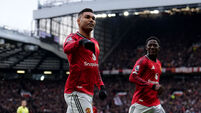Larry Ryan: What is football trying to sell us next?

Paul Pogba has linked up with Cryptodragons, a digital collectible company that promises ‘10k limited collection of one-of-a-kind NFT Eggs’.
One of these days, I will work out what exactly an NFT is and how to acquire one. It will be too late, of course. I will be Joe Kennedy’s shoeshine boy, putting every penny in ethereum just as the chain gets blocked or whatever.
It’s doubtless already too late, now the crypto world has set its sights on the people traditionally most easily parted from their money — football fans.












